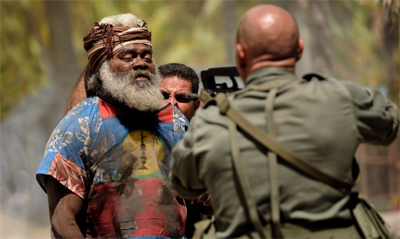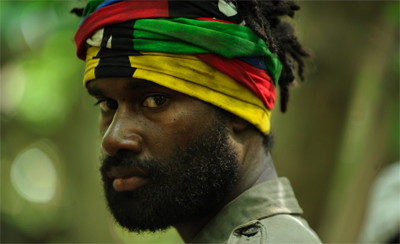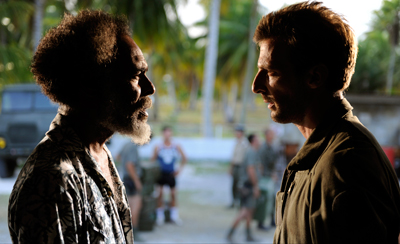Christophe Rossignon Rebellion Interview

Christophe Rossignon Rebellion Interview
Cast: Mathieu Kassovitz, Iabe Lapacas, Malik ZidiDirector: Mathieu Kassovitz
Genre: Action, Drama, History
Running Time: 129 minutes
Synopsis: April 1988, Ouvéa Island in the French colony of New Caledonia. 30 policemen are kidnapped by Kanak separatists.
300 French special-forces operatives are sent to restore order.
Two men face off: Philippe Legorjus, captain of the GIGN, an elite counter-terrorism police unit, and Alphonse Dianou, the rebels' leader.
They attempt to find a peaceful solution based on common values and dialogue.
But, against the backdrop of presidential elections in France, the political stakes are high, and order is not necessarily a moral question.
With this violent and troubling saga based on real-life events, Mathieu Kassovitz makes a powerful comeback in front of and behind the camera.
Release Date: April 12th, 2012
Website: www.lordreetlamorale-lefilm.com
Interview with Christophe Rossignon
Question: How did you react when Mathieu Kassovitz came to ask you to coproduce Rebellion?Christophe Rossignon: Actually, I was already aware of the project because Nord-Ouest was initially a partner when Mathieu set up his production company, MNP, and Rebellion was one of his projects in development. Meantime, Mathieu has bought back complete control of his company, but he had already made his first trip to New Caledonia, we had met Philippe Legorjus and been impressed by the cinematic potential of this story. Mathieu continued developing his career, both in the USA and with films he produced with his partners at MNP, while went our own way. Then, one day, Mathieu got in contact with my partner Philip Boëffard and myself, saying, "This movie's too big for my little outfit, not only in financial terms, but for me as well. It's difficult to be everywhere at once. Even on the script, I'd like to have your input." It was easy, almost natural, teaming up again.
Question: What do you think motivated Mathieu Kassovitz about this project?
Christophe Rossignon: Several things. The human angle, first of all-the encounter between these two guys, Legorjus and Dianou, who have nothing in common except a desire to see justice be done. Then, the political aspect that led politicians in the middle of a presidential election campaign to authorise the assault on the cave resulting in the deaths of 19 Kanaks when the captain of the GIGN unit was on the way to finding a peaceful solution. And then, the Kanaks' cause. Not in the partisan sense, but just to key into the colonial issue and make their voice heard. When you go there, as Mathieu has and I have, you can't not be touched by the Kanaks' soulfulness, their age-old culture, respect for the elders and nature, their amazing receptiveness, the "custom"... What also motivated Mathieu was the universal nature of the story, of events back then, in the sense that nobody listened to these people who were merely claiming their right to be different. It wouldn't have been hard to listen to them. And finally, I think Mathieu also wanted to make another film-without overplaying comparisons with La Haine-that had a political edge without being dogmatic. All those motivational elements combined from the start and they never changed.
Question: When Mathieu got back in touch with you, what were your initial priorities?
Christophe Rossignon: We began-Philip, Mathieu and I-by listing the difficulties ahead. Deals with the earliest partners on the project needed to be concluded and others needed to be found. Shooting in New Caledonia wasn't a foregone conclusion. Agreement had to be reached with the Kanaks and the army, whose support we still had hopes of receiving. There were lots of things that needed moving forward, including the script, which had progressed well but still needed polishing up.
 Question: Did Mathieu Kassovitz already intend to play Legorjus?
Question: Did Mathieu Kassovitz already intend to play Legorjus? Christophe Rossignon: He was mulling it over. At first, he was looking for someone else, but I kept telling him he should take the part. It seemed to me that going back to directing a film like this involved acting in it. I sensed that the actor would offer the director protection. Mathieu is a unique and well-liked actor, so he was a real asset for the film. What's more, I was convinced that he would carry the movie even better if, in his mind, he was Legorjus. With regard to the Kanaks, it was also a sign of his total commitment to the project. His physical and mental commitment as director were an enormous help to him as actor when playing the role of the negotiator. Also, for the non-professional Kanaks and army veterans in the cast, he was a great guide on set. So, we resolved one problem after another, the most serious being the shoot in New Caledonia.
Question: What happened?
Christophe Rossignon: After our permission to shoot was withdrawn in summer 2009, closing down preparations there, I traveled to New Caledonia to explore the possibility of shooting in summer 2010. During my stay, I participated at various "customs"-open meetings with tribal chiefs-and spent numerous hours explaining what the movie entailed, what we could do and what we couldn't. It was down to me, the relative newbie on the project, to explain the film Mathieu wanted to make, which wasn't necessarily the film they would have made. I had to set out his point of view, justify his choices, say why he had chosen Legorjus as the main character and inform them of how the movie would open and end. I tried to demonstrate that Mathieu had made the right choices. I was very surprised the curiosity of people, even the old folks who knew nothing about movies but asked me lots of astonishingly specific questions: how do you fund a production like this? What was the impact of a French film overseas? And that of the movie? It was really exciting. After that, I had one-to-one meetings, I met the families and we debated the issues in one camp and then another. I stayed a little over one week-ten intense and extremely rewarding days. Alphonse Dianou's son, Darewa, was blocking the project, even though he had initially supported it, helped Mathieu and considered playing the role of his father. I tried to get a mediation process going. Olivier Rousset, who was my guide, and Mathieu's guide throughout this project (he plays the guy holding the drip over Alphonse Dianou at the end) managed to get Darewa to agree to see me in the presence of "the papas" as the elders are known over there.
After many hours' discussion late into the night, he said, "I'll let you make your film. I say so now in front of my elders and I won't go back on my word." Unfortunately, next day at 7 a.m., he barreled into my hotel talking like a crazy man, saying he'd changed his mind and threatening to make trouble if we shot the movie. That was the end of that. It was obvious we'd never get all the permission we needed to shoot in Ouvéa. At the airport, waiting for my flight home, I spoke one last time to Mathias Waneux, a tribal chief, elected representative and highly respected figure in New Caledonia who has always supported the project and done all he could to make it happen. He said that we should maybe think about shooting somewhere else. I arrived home down in the dumps, convinced the film was at a dead-end. When I mentioned the idea of shooting outside of New Caledonia to Mathieu, he said he wouldn't hear of it. I asked him to let me try to find a place that would look like Ouvéa, and suit him and the Kanaks. Our location manager, Guinal Riou (one of the key people in getting the movie made) studied all the potential locations in the Pacific and beyond. He set off for Polynesia with a small crew on a scouting mission. At the same time, in Paris, I met with Paul Néaoutyine, a Kanak leader and governor of Northern Province. He wanted to reiterate his support for the project and its crucial importance. He mentioned a place in Polynesia, Anaa Island, that he had visited some years before and that looks just like Ouvéa at the time of the tragedy. It was the exact same spot that Guinal had scouted out! Mathieu flew out there, gave his approval and we sent a bigger crew out to start preparations for the shoot. Meanwhile, we continued to resolve our remaining problems one by one: funding, the huge overspend caused by all the various issues and glitches along the way-the time and money wasted in New Caledonia, having to start over in Polynesia and fly out about forty Kanaks who would appear in the film.
 Question: Did you have trouble getting funding because of the film's subject matter?
Question: Did you have trouble getting funding because of the film's subject matter? Christophe Rossignon: It took time to put all the deals in place, but we did it. The problem wasn't the subject matter but the uncertainty hanging over our shoot in New Caledonia. Our partners-UGC and Studio 37 on one hand, Orange Cinéma Séries on the other-gave us their full backing. They really believed in Mathieu's directorial comeback, even though he had started out planning to self-produce the movie. They always believed in the project and never had any doubt that we'd get it made. Hats off to them. When the project reached Nord-Ouest, Philip Boëffard and I set up deals with terrestrial TV and other funding bodies (and injected money of our own). We lost some funding from New Caledonia when the shoot switched to Polynesia, but Northern Province and Islands Province chose to show their official support by providing some residual funding.
Question: Why didn't the army support the project in the end?
Christophe Rossignon: I met senior officers who argued that participating in the movie would be a good way to acknowledge what happened and move on. The army could hardly deny the atrocities because Michel Rocard, the French Prime Minister who negotiated an agreement with the FLNKS, had officially admitted they took place in order to justify a general amnesty for crimes committed on both sides. Rocard added that the atrocities weren't committed on orders from the top brass but that, by bringing in shock troops for the assignment, there was a risk of them occurring. For a long time, we hoped we'd get the army's support, even though it was never confirmed to us. We took our case very high, to the government and president's office, but we were informed it was a decision for the Chief of Staff, who refused to allow the army to participate in any way. That was a real problem. In France or Europe, there are simple but costly solutions when making a film of this scale without the army's support. There are always collectors who have Pumas, Jeeps, uniforms, disarmed vehicles and so on, but way out in the Pacific, there's nothing, just a few old wrecks. It was very complicated, but we got by.
Question: How much did you bring the film in for in the end?
Christophe Rossignon: Around �13.5 million. The shoot was epic, intense, one of the most complicated Philip and I have ever faced but, even though we had to grit our teeth, a week after the shoot we'd forgotten about all the problems we'd encountered. The overriding emotions were a sense of achievement and enjoyment of a wonderful shared experience.
Question: What touches you most in the finished movie?
Christophe Rossignon: Its humanity. I think it's a wonderful exploration of the human spirit, including Mathieu's character, the elite forces captain who betrays his personal ethics to obey orders and assumes the consequences. How can you not be touched by his attitude, determination to see the job through and to resolve the conflict without any greater loss of life? What also touches me, obviously, is the humanity of the Kanak community. I'm also struck by the modern aspect of the movie, what it says about politicians' behavior and the questions it asks our fellow citizens.
Question: Did you choose your character in the movie-a radical army officer who even suggests dropping napalm on the cave?
Christophe Rossignon: No, it was Mathieu's suggestion. Actually, I owe all my appearances in films I produce (and those I don't produce) to him. A long time ago, we made a bet that I would drive a vehicle in all of his films. Since then, I've developed a taste for these "drive-on" parts that give me a chance to "play the actor." I have to confess that I'm tempted to take it a little further.
Question: In what way would you say Mathieu Kassovitz has most changed between Métisse and Rebellion?
Christophe Rossignon: He'd already changed between La Haine and Assassin(s). Then, he became a father and time had its usual effect-you get older and wiser, as they say. Now, besides his maturity, I'd say he deploys that wisdom while remaining true to his instinctive nature, which to my mind is his best quality as a director, even if it's not the easiest quality to keep up with day to day! Mathieu is a wonderful actor, always pitch-perfect without looking as though he's trying, and an incredible director. When we were shooting La Haine, I remember him saying, "I need an idea for every shot." But the film is never ostentatious, there are no flashy shots in it. On this film, without him saying those words, he was the same, constantly coming up with ideas, and in the end I think his film is very inventive yet completely natural. He has an amazing cinematic sixth sense. It was great teaming up with Mathieu again, even if it was tough at times, even if we clashed at times. The film was tense, difficult sometimes, grueling, which is only natural when 200 people rock up on a remote island 18,000 kilometers from your base. An island with a population of 300, complicated logistics... A human pressure cooker that had to be handled very gently. On top of that, we had to cope with script changes on the fly, but Mathieu was always very attentive to our problems, always trying to find solutions, especially when the investments required were beyond what we could imagine. For all of us, it was an epic adventure. We're proud to have produced this movie and to have contributed to Mathieu's return to this style of movie. Proud and delighted.
MORE
- Mission: Impossible Fallout
- Glenn Close The Wife
- Allison Chhorn Stanley's Mouth Interview
- Benicio Del Toro Sicario: Day of the Soldado
- Dame Judi Dench Tea With The Dames
- Sandra Bullock Ocean's 8
- Chris Pratt Jurassic World: Fallen Kingdom
- Claudia Sangiorgi Dalimore and Michelle Grace...
- Rachel McAdams Disobedience Interview
- Sebastián Lelio and Alessandro Nivola...
- Perri Cummings Trench Interview



